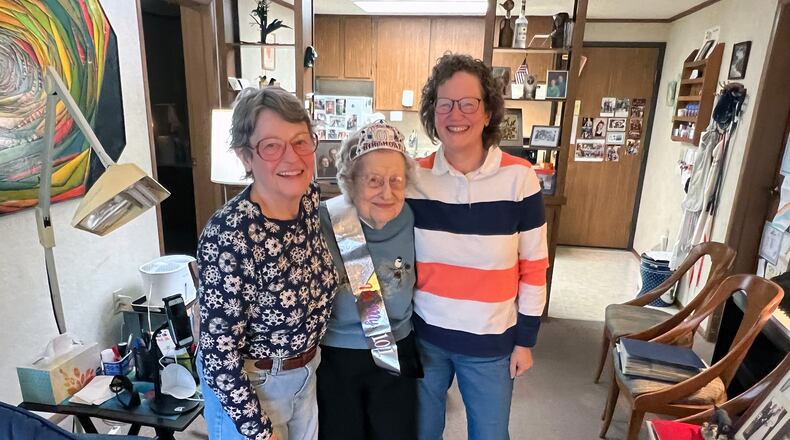But those who know Klarer well also know that there is a lot more to her living a long life than what she eats.
“She’s a strong woman, both mentally and physically,” said Nancy Aubel, Klarer’s oldest daughter. “She takes care of her health and is very social. And that helps a lot.”
Born in 1921 in East Lansing, Michigan, Klarer said she had a traditional upbringing. Her father believed in raising a daughter to take care of a home and family and only work prior to getting married. But Klarer’s mother encouraged her to pursue an education and eventually she enrolled at Michigan State University, which was close to home.
“I found out that one of my girlfriends was going to school at DePauw University and I told my parents I’d love to go away and live in a dorm,” Klarer said.
Klarer convinced her parents to allow her to leave home to attend DePauw, where she graduated with a degree in English. Her first job ended up being a disc jockey at a radio station in Fort Wayne, Indiana. And it was there she met the love of her life – a civil engineer named David Klarer.
“I met David in May of 1943,” Klarer said. “He asked me to out with him on a Saturday and I said I was going to church the next day, so he said he’d go with me.”
The couple became inseparable, going out every evening after Klarer’s 3-9 p.m. shift at the radio station. But with World War II raging, David, who was a navigator with the Army Air Corps (later the Air Force), was soon to go overseas.
“My parents had a short time together before Dad gave mom his wings,” said Aubel. “But they corresponded until he finally came home in 1945.”
Aubel said her parents both saved all of those letters and she keeps them to this day. They tell the story of a couple who fell in love amidst the tumult of a world war, never doubting that they would eventually be together.
On January 2, 1946, the couple were married in Lansing, where Klarer was teaching high school English. But because married women could not continue to teach, Klarer had to regretfully tender her resignation.
The couple ended up having three children together – two daughters and a son. David’s military career took the family to many places around the country, from Chattanooga, Tennessee, where they had their first home, to Fairborn, Ohio, where David ended up retiring from his career with the Air Force and going back to work for the Department of Defense. In between, the family moved at least 11 times.
For Klarer, moving to different places meant meeting new people and getting involved in the communities. An avid volunteer, she taught GED classes to adults in the Fairborn Adult Education program. She remained active at St. Christopher’s Episcopal Church in Fairborn, the church she helped to found. She learned to play the organ when the church needed an organist and also filled in at the Wright Patterson Air Force Base chapel. She also served as the dean of the Dayton chapter of the American Guild of Organists and helped organize the first local convention.
One of Klarer’s longest volunteer positions was at the National Museum of the United States Air Force, where she served for nearly 30 years.
“She would grab people as they came in and they would love hearing about her passion for the Air Force,” Aubel said. “When Dad retired in 1980, he started volunteering with her.”
Klarer started volunteering as a tour guide at Carriage Hill Farm and when her husband joined her in 1982, they helped initiate a PBS short film called “The Fireplace Chef,” produced to demonstrate ways to save energy by cooking over a fireplace. She was a member of the Dayton Philharmonic Women’s Association and was active in several key fundraisers, including the “Designer Show Houses.” The couple also raised a champion Gordon setter and ended up rescuing another 10 of these dogs throughout their lives together.
In 2011, the couple moved from their home in Fairborn where they had raised their family to Brookdale Kettering. David passed away in March of 2012. The couple had been married 66 years.
“She has such a varied life experience,” Aubel said. “But it’s always been about giving to others and making sure that you pay in service for all you have.”
And today, giving back means mostly giving hugs and comfort, especially important over the couple of years when so many older Americans were living in fear for their lives during the COVID-19 pandemic.
“When I moved here, I decided I would be more of a hugging person,” Klarer said. “I care about everybody and anytime I see someone who needs some boosting up, I just do it. I still have things to do, and I think that’s why I’m still here.”
About the Author





